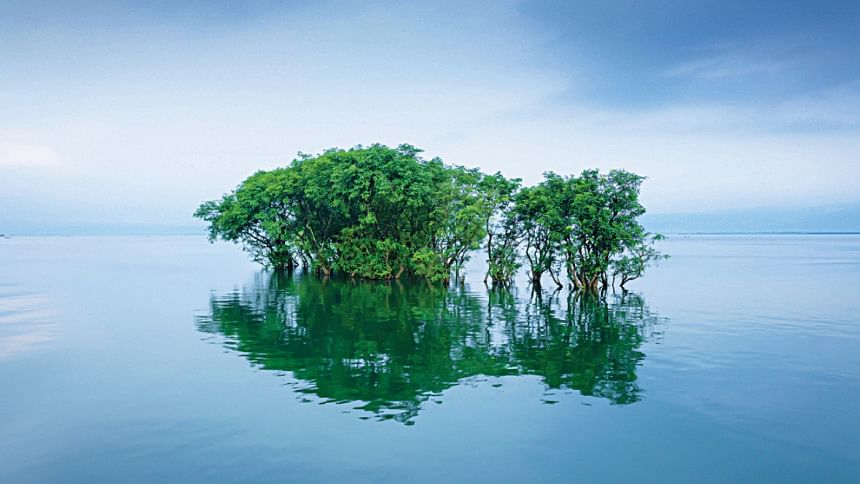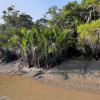Harvesting resources from nature, safely

NABAPALLAB is a project aimed at developing and implementing Nature-Based Solutions for adaptation in selected ecologically critical areas (ECA) in Bangladesh. The Ministry of Environment, Forest and Climate Change (MoEFCC) will steer the project entitled "Nature-Based Adaptation towards Prosperous and Adept Lives and Livelihoods in Bangladesh" (NABAPALLAB). A total of nine national and international organisations will contribute to the project, led by CARE Bangladesh in partnership with CNRS, Cordaid, C3ER-Brac University, DSK, Friendship, HI, IDE, and Practical Action. NABAPALLAB is funded by the UK's Foreign, Commonwealth and Development Office (FCDO).
The impacts of weather and climate change are being felt globally. All countries of the world will now have to cope with various natural disasters. In fact, the level of adverse impacts felt in Bangladesh is already high and likely to worsen in the coming days. In some assessments, Bangladesh is counted as one of the most vulnerable countries to adverse climate change impacts.
The intensity and frequency of various types of floods in Bangladesh will increase; drought and drought-like weather will prevail; the frequency and intensity of cyclones and storms will increase; saline and brackish water will move inland due to rising sea levels; rainfall will also not follow the established weather pattern; and heat waves will be more and more prevalent in the summer. In the long run, food security will be threatened, there will be a crisis in the availability of safe drinking water as well as negative impacts on the health sector. The poverty level will increase, natural disasters will be more frequent, and people's livelihoods will see many disastrous impacts.
A reduction in greenhouse gas emissions can mitigate the global warming process. But this will face a huge number of challenges. Moreover, it is believed that the rise of global average temperature will continue unabated.
In the face of these adverse impacts, Bangladesh finalised and approved a National Adaptation Plan (NAP) in 2022. Globally, it has been accepted that approaches contained in Community-based Adaptation (CbA), Ecosystem-based Adaptation (EbA), Locally Led Adaptation (LLA), and Nature-Based Solutions (NbS) shall be followed to respond to the impacts of global warming. Bangladesh has also identified a number of Ecologically Critical Areas (ECA). The ecosystem and biodiversity in these areas are rich, but adverse impacts are sure to affect the livelihoods of people living in and around these ECAs. The goal and objective of NABAPALLAB is to assist these people and to take on adaptive measures that would support the nature and ecosystems as well the livelihood of the people. For Hakaluki Haor (declared an ECA in 1999) and the 10-km ECA in the Sundarbans, two management structures will be developed. The people dependent on these two biodiversity-rich areas will be trained on the proper approach to harvesting resources from nature and also reduce their dependence on the biodiversity of the area. The beneficiaries will increasingly use renewable energy and the availability of safe drinking water will be ensured. The process of issuing warnings of natural disasters will be reviewed and the warning system will be made easy for the beneficiaries. The project will recognise that by ensuring the livelihood securities of ECA-dependent people, it will be possible to ensure that they take part in the protection of the ecosystems.
NABAPALLAB plans to pioneer science and environment-based harvesting of resources from nature, effective disaster management practices and provision of adequate safe drinking water and sanitation systems. One of the important approaches of the project will be the effective and active engagement of beneficiaries in project management. The sustainability of the completed project will be ensured through proper capacity building, and steps will be taken to properly document knowledge that will be generated in the process.
Dr Ainun Nishat is a professor emeritus at Center of Climate Change and Environmental Research of BRAC University.
Views expressed in this article are the author's own.
Follow The Daily Star Opinion on Facebook for the latest opinions, commentaries and analyses by experts and professionals. To contribute your article or letter to The Daily Star Opinion, see our guidelines for submission.

 For all latest news, follow The Daily Star's Google News channel.
For all latest news, follow The Daily Star's Google News channel. 










Comments